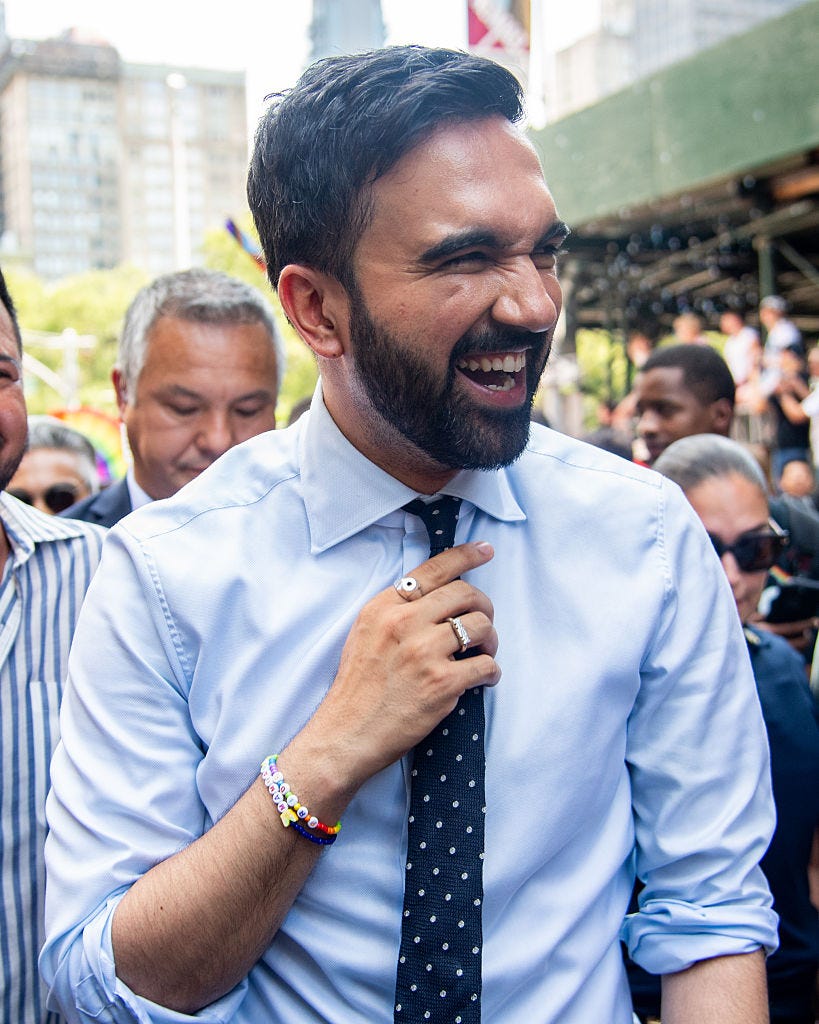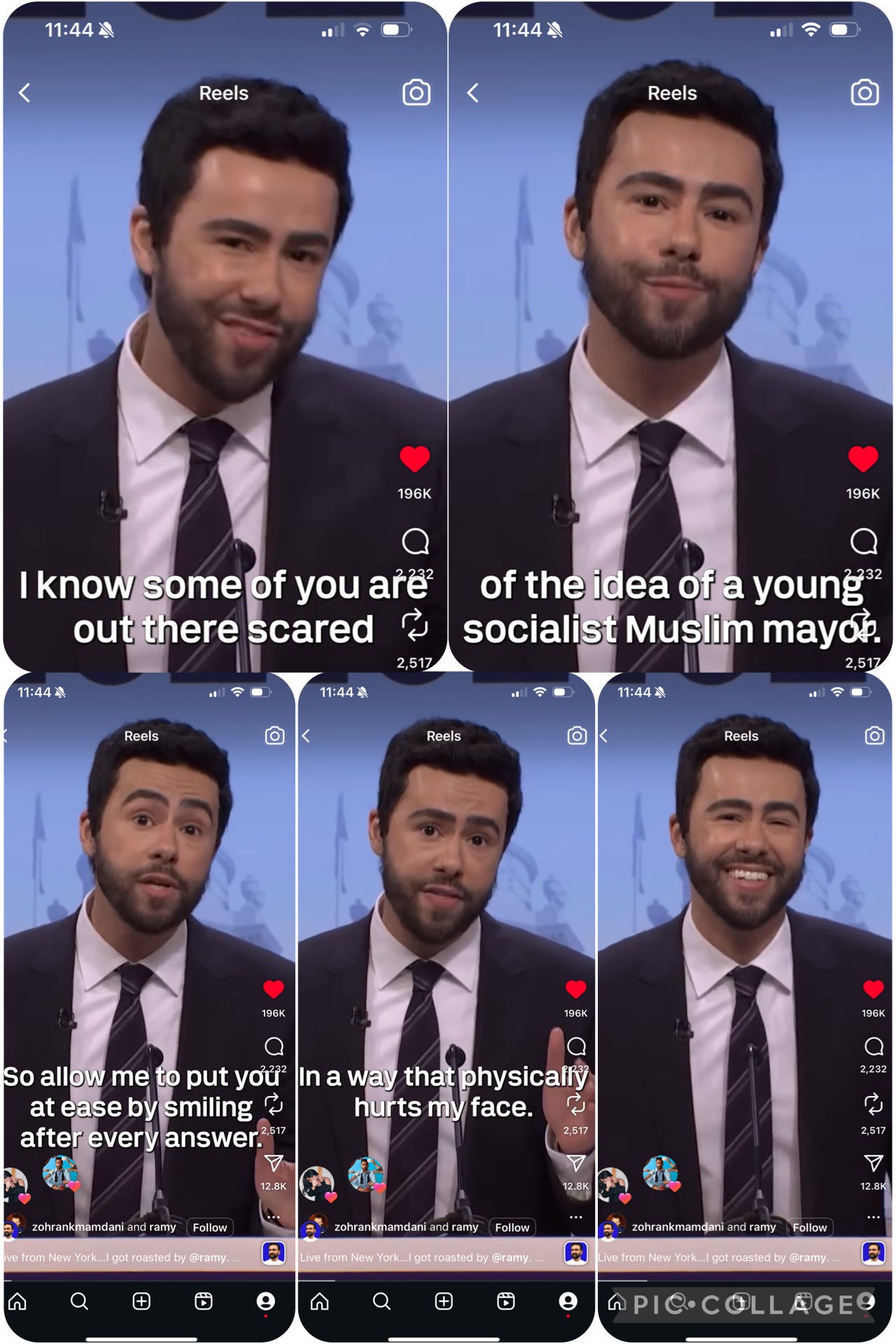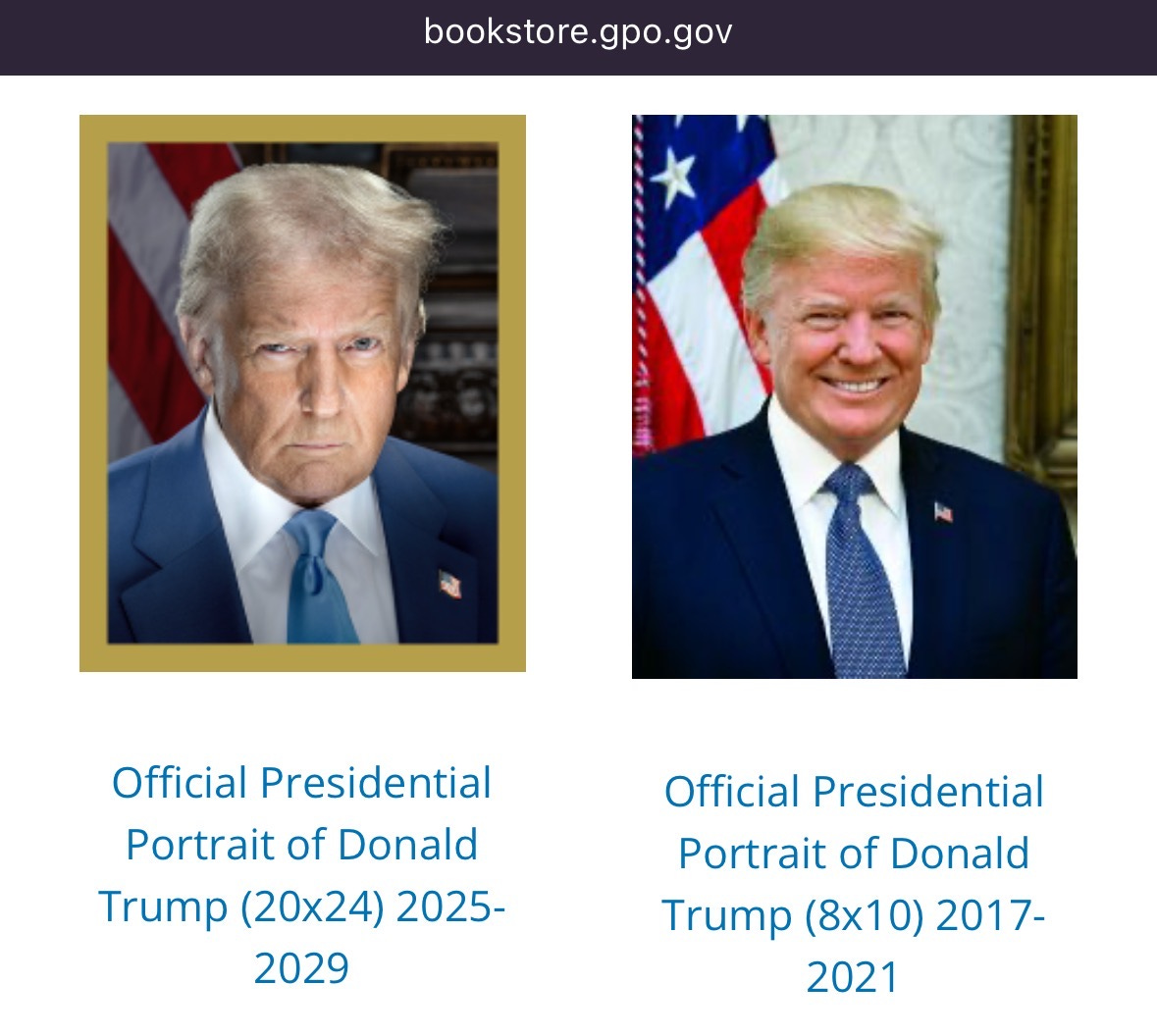I begin with a confession. On more than one occasion (OK, three), I have finished watching a video of Zohran Mamdani speak and hurried to a mirror to work on my smile. I have no plans to run for office, but the Mamdani grin is so striking, so politically potent, so confounding to his foes, so distinct from the projected affect of many of the New York mayoral candidate’s own allies, so full of sun in the dreariest timeline, that I have wondered about my own. Do I smile enough? Do I ever smile? Was my grandmother right that I look angry in my book jacket photos? Am I angry? Why am I so angry? What kind of life could I have had if I could smile like that guy? And in the mirror I try it, and what my brief study has found is that a smile so broad physically hurts. It doesn’t seem to hurt Mamdani, though. It may be why he wins.
Before you say that’s ridiculous, let me explain. With a smile. Ow.
To be clear, the heart of the campaign was always substance. A million New Yorkers could probably name his key policy ideas: fast and free buses, universal childcare, and a sweeping rent freeze. His opponents have struggled to offer much more than fearmongering about his substance. Mamdani is running as a Democrat who wants to do very specific and understandable things to make life more affordable, and therefore uncork the dreaming and creation that can spill forth when life becomes more than a struggle merely to sustain itself — at a time when, nationally, Democrats are struggling to figure out who they are and how to be more than just Not Trump.
As a result, I kept noticing Mamdani’s smile and minimizing it to myself as any kind of important theme. Because, naturally, it’s about the policies; it’s about the big ideas; and it is. But the question is how he has been able to turn the “capitalist capital of the world” into “the epicenter of an ascendant and impatient socialist-led rebellion,” as The New York Times recently put it. And how he has been able to rouse 90,000 people to volunteer for his campaign — a staggering figure that translates into the sight of Mamdani canvassers everywhere in New York. And how he has been able to win over enough skeptics to get to this historic precipice.
And into the mix of factors I’d throw the smile.
You know the smile. It is a face-filling, muscle-tensing, high-octane power beam that flares every time Mamdani comes to a podium, every time he is in between sections of a speech, every time he approaches a prospective voter on the street, every time he is filmed dancing in nightclubs in the dead of night, every time he hears someone in the crowd yell “Habibi!” Like every politician’s smile, it is more than a facial expression. It is rhetoric. In his case, it seems to project a mix of things — genuine joy in the process of campaigning itself, confidence and a certain aboveness, accessibility to all comers, refusing to mirror the demeanor of those who traffic in fear of him.
Ronald Reagan’s smile put an aw-shucks, gee-whiz patina on a policy agenda that would wipe smiles off millions of faces. Barack Obama’s smile cast him as cool as a cucumber, a rock star whom you wanted to follow as a fan as much as a citizen (and who would let you down if he turned out to be merely mortal). Alexandria Ocasio-Cortez’s smile on her thronged Instagram lives is the smile of up-close-and-personal relatability in the social-media age, an insider bringing you on her strange ride.
The Mamdani smile — being a basic thing, a smile — has echoes of others. But it is also very much its own thing, a phenomenon made for and addressed to the exigencies of this political moment. So much so that “Saturday Night Live” recently roasted it.
One of the many things I read in the smile is a break from a dominant affect of today’s progressivism. Mamdani is as bona fide a progressive as they come. And this frees him to adopt a steadfast sunniness, encapsulated by but not limited to the smile, that distinguishes him from many who share his worldview. Some progressives will scowl as they read this, thereby proving my point, but progressivism has an affect problem. It is fueled by righteous anger, which it sometimes fails to transcend. America today is depressing, but being depressing is no way to win people over to make America less depressing. Sometimes progressivism struggles to be more than just the sum of the injustices it fights, the boots on necks that it wishes to dislodge. It can be angry and pessimistic to the exclusion of reminding people of its own victories as a movement. It can be hostile to people who agree partly but not entirely. It can value purity over welcome and conversion. And there is something in Mamdani’s smile that breaks from all that. It says: I am against many things, and I want to do and create many things because of the things I am against, but I am more than what I am against.
There is also in the Mamdani smile a kind of foreshadowing and a kind of transference. The conditions he is describing, the conditions that have motivated his campaign, are harsh. He is the candidate of those who are sick and tired of working nonstop, busting their hump, and struggling to afford shelter and food and maybe even some gaiety. The smile, then, is not a mirror but a window, to use a frame from the photographer John Szarkowski. It is not playing back to voters what they feel; in fact, it almost risks mocking their feelings. Rather, it shows what you might feel if he won. In the words of the political strategist Anat Shenker-Osorio, it paints the beautiful tomorrow. He is smiling the way you may smile when you can drop your kid off at free daycare, catch a free bus, watch a movie with your spouse instead of arguing about the impending rent hike. He is embodying what the lifting of certain stressors in your life would translate into. As an aide to Bernie Sanders once put it to me, Mamdani is “assigning an emotion” to the policy agenda he is championing.
A smile can be a complicated thing. Service workers are forced to smile when they’re not feeling particularly smiley. Black enslaved people and domestics were forced to smile no matter how crushing the racial apartheid grew — and those smiles became part of racist imagery. Immigrants are expected to be grateful for the opportunity and to grin and bear it. The smile, then, can signify oppression and a lack of choice and people doing what they must. But this is not Mamdani’s smile at all. In that sense, his smile even as he speaks of battling various injustices reclaims the agency of the grin.
Deployed in the way he uses it, his smile evokes something of former President Joe Biden’s talent at what I call reasonablizing — making policy that could scare people off seem like common sense. Mamdani has triggered legions of haters and exaggerators and outright fabulists who baselessly accuse him of anti-Semitism and wanting to abolish the police and bringing Islamist rule to New York City. These things demand fact checks, and get them. But the Mamdani smile has served to reasonablize him. He simply does not look like the kind of person about whom these lies could be true. He does not look like he hates the people they lie and say he does. The smile rightly casts his haters as ridiculous.
In the smile, there is also something of the immigrant story — the aspiration, the faking it till you make it, the believing in the dream until one day maybe it will come true. He is himself an immigrant. He represents Queens in the New York State Assembly, the most immigrant-rich zone in a country of immigrants. And in the immigrant story in America there is an incandescent hope that defies logic. You smile first, and then, with some hard work and luck, you have something to smile about. You FaceTime back home and put on a brave face to those you have left, telling them how great it is going when that isn’t yet true. And you’re not lying or misleading. You smile because, to you, what you will do is more vivid to you than what you have been.
New York is not a smiley city. You go to Iowa, and you realize that other places run on an economy of smiles, the way other places run on an economy of guilt. New York is fast, a little harsh, all about the business at hand, not superfluous, totally focused, trying to catch that train because if you catch that train you make the other train, and in a city such as this, who has time to smile? And so Mamdani’s smile also feels alien, borrowed, Midwestern, like it’s not from around here. But it is. And perhaps that has had a certain quiet appeal in a city and country craving community. All around us, people know they feel something missing, especially after Covid, and it’s other people. The smile telegraphs a movement that is more than just a political cause. Ninety thousand people don’t sign up simply to do a task. They sign up to belong, to be part.
Look at these two official portraits of Donald Trump. The one on the right was his choice during his first term. Then there was a stinging loss, an insurrection, four years in the wilderness, a time of plotting. And how does he signal his return? By losing the smile. By adopting the face of retribution, a resolve to crush his enemies.
One version of the question Democrats have grappled with lately is whether you fight fire with fire, or with water. Whether you fight authoritarianism with drastic actions like redistricting, or by sticking to the rulebook. Or whether, you could say, you meet scowl with scowl — or with something like the Mamdani grin. Is the antidote to this heartless, cruel Trump presidency a hardness in the opposition, a take-no-prisoners attitude that would surely become, in time, the culture we all swim in? Or is it a ruthless drive to care, to mend, to weave, to join, embodied in a mile-wide smile?






I could not agree more with your insightful and hopeful vision of who he is and what his smile might mean. I see him as full of JOY,that is genuine and that is compelling ESPECIALLY in such a dark political climate. Let us all remember the exuberance, hopefulness and yes, love, embodied within true joy. And May it spread! (And as for your smile, Anand, it suits you, it is real, and don’t worry about it. You do you and you do it with panache. Your interviews, the deep thought you put into questions with your guests is remarkable and yes, a joy! Thank you.)
Love this, Anand! I can even "hear" Mamdami's smile when he is speaking and all I have is the audio. He brings realistic joy to what he says. He laughs at and with himself. For all his terrific policy positions, he comes across as real and approachable. His smile is definitely a part of the authenticity that he oozes. He is gonna be great for New York, and great for the country.